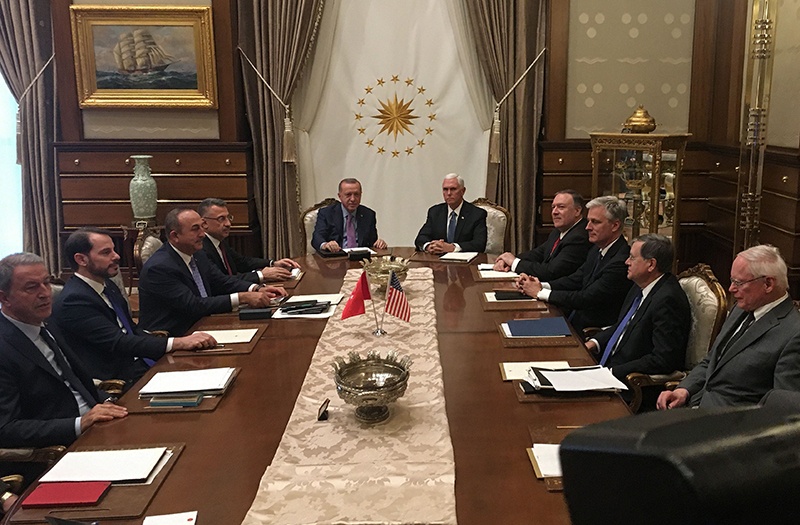
WASHINGTON: US President Donald Trump warned Turkish President Tayyip Erdogan in a letter about Turkey's incursion into Syria, "Don't be a tough guy" and "Don't be a fool!" The Oct 9 letter was released by the White House on Wednesday as Trump battled to control the political damage following his decision to pull US troops out of northern Syria, clearing the way for the Turkish incursion against America's Kurdish allies.
The letter tried to persuade Erdogan to reverse a decision to invade Syria that Erdogan told Trump about in an Oct 6 phone call. "Let's work out a good deal!" Trump said. "You don't want to be responsible for slaughtering thousands of people, and I don't want to be responsible for destroying the Turkish economy - and I will." Trump had the letter released to bolster his view that he did not give Turkey a green light to invade Syria. Many lawmakers have been sharply critical of his decision to remove American forces from the conflict zone.
"I have worked hard to solve some of your problems. Don't let the world down. You can make a great deal," said Trump in the letter. The president wrote that the commander of the Kurdish-led Syrian Democratic Forces, General Mazloum Kobani Abdi, was willing to negotiate and to make some concessions. He said he had confidentially enclosed to Erdogan a copy of a letter Mazloum had sent him. "History will look upon you favorably if you get this done the right and humane way. It will look upon you forever as the devil if good things don't happen. Don't be a tough guy. Don't be a fool!" said Trump. He added: "I will call you later."
Kurds accuse Turkey
Meanwhile, the embattled Kurdish authorities in northeastern Syria yesterday accused Turkey of resorting to banned weapons such as napalm and white phosphorus munitions, a charge Ankara has denied. The use of such weapons since the start of the cross-border assault by Turkey and its Syrian proxies could not be confirmed independently. In a statement issued eight days into the deadly offensive, the Kurdish administration said Turkey had resorted to their use because of unexpectedly stiff resistance by Kurdish fighters in the key border town of Ras al-Ain. "The Turkish aggression is using all available weapons against Ras al-Ain," the Kurdish statement said.
Turkish President Recep Tayyip Erdogan has so far ignored international pressure to halt the offensive, which has killed dozens of civilians and forced more than 300,000 people to flee their homes. "Faced with the obvious failure of his plan, Erdogan is resorting to weapons that are globally banned such as phosphorus and napalm," the statement added. Turkish Defense Minister Hulusi Akar yesterday denied the charges. "It is a fact known by everyone that there are no chemical weapons in the inventory of the Turkish Armed Forces," he told reporters. He accused Syria's Kurds of "using the chemical weapons (themselves) in a bid to blame us."
Call for international experts
The Syrian Observatory for Human Rights, a Britain-based monitoring group with a wide network of sources on the ground, could not confirm the use of napalm or white phosphorus. But Observatory chief Rami Abdel Rahman said there had been a spike in burn wounds over the past two days, mostly casualties brought in from the Ras al-Ain area. Kurdish officials posted a video on social media showing children with burns one doctor in Hasakeh province argues are consistent with the use of banned weapons.
Made notorious by their widespread use by US forces in the Vietnam War, napalm and related chemicals are mixtures of a gelling agent and a volatile petrochemical used in incendiary bombs. White phosphorus can be used to create a smoke screen or as a battlefield marker, but it can also be deployed as a deadly incendiary weapon, a use prohibited under international law. A spokesman for the Syrian Democratic Forces, the autonomous Kurdish region's de facto army, called on international organizations to send in experts. "We urge international organizations to send their teams to investigate some wounds sustained in attacks," Mustefa Bali said on social media. "The medical facilities in NE Syria lack expert teams," he added.- Agencies
.jpg)
